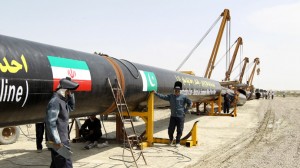 TEHRAN (Tasnim) � The Iranian oil minister and his Pakistani counterpart met here on Monday to discuss the Iran-Pakistan gas pipeline project, more than a month after Zanganeh said he no hope of exporting gas to Pakistan due to lack of financing to finish building the pipeline.
TEHRAN (Tasnim) � The Iranian oil minister and his Pakistani counterpart met here on Monday to discuss the Iran-Pakistan gas pipeline project, more than a month after Zanganeh said he no hope of exporting gas to Pakistan due to lack of financing to finish building the pipeline.Shahid Khaqan Abbasi�who arrived in Iran at the head of a high ranking delegation that includes of Deputy Oil Minister Mobin Solat, the head of Pakistan�s Inter-State Gas System, and a number of other officials held his first round of talks with Oil Minister Bijan Namdar Zanganeh.
This was the first direct contact between Iran and Pakistan at a ministerial level on the IP gas pipeline project after the inauguration of project by the presidents of both countries in March 2013.
A high ranking Pakistani official had said on December 5 that Iran and Pakistan were scheduled to figure out a strategy for finalizing the IP gas pipeline.
Under the existing PA gas contract, Pakistan is bound to lay the pipeline -- 781 kilometers in its territory from MP 250, a point on the Pakistan-Iran border, to Nawabshah -- by December 2014.
Pakistan has, according to its concerned officials, very little time left to do so, which is why it needs to renegotiate with Iran on extending the deadline of the project.
�Even if we have liquidity and the required financing for laying down the pipeline, even then we will not be able to accomplish the project by December 31, 2014,� a Pakistani official said.
However, he said if all financing and US sanctions issues are settled, Pakistan would only need 16 months to completely lay down the Pakistani section of the pipeline in its territory.
In late October, Iran's oil minister said he was not hopeful about exporting natural gas to neighboring Pakistan. "For the time being, we are not hopeful for gas export to Pakistan, because the conditions set by the Pakistani government has made export of Iranian gas to Pakistan unlikely," he said.
Earlier reports said that Iran's southeastern neighbor has asked the Islamic republic to finance on the gas pipeline to be built on Pakistan soil. Iran has already built its share of pipeline to its border with Pakistan on its soil.
The initial capacity of the pipeline was to be 22 billion cubic meters of natural gas per year, which was expected to be raised later to 55 billion cubic meters. However, as a bilateral project between Iran and Pakistan, the pipeline will carry only 8.7 billion cubic meters of gas per year as contracted and 40 billion cubic meters as a maximum capacity.
Iran exports natural gas to Turkey, Armenia, and Azerbaijan, and receives pipeline imports from Turkmenistan and the Republic of Azerbaijan.
Iran has a 10-year contract to export gas to Iraq to be used as fuel in three of its power plants. It expects to begin exporting gas to neighboring Iraq by July next year, with initial volumes set at 7 million cubic metres per day, an the volume expected to increase to 25 mcm/day by 2015 and ultimately 40 mcm/day.
The two countries will soon seal another agreement on export of another 50 mcm/day of gas to Iraq's southern city of Basra.
Although it is second to no country in terms of gas reserves, Iran's own consumption has risen more markedly than its production - caused by heating, power generation and oilfield reinjection needs- to make it a net importer.
By Tasnim News Agency�
The Iran Project is not responsible for the content of quoted articles.










